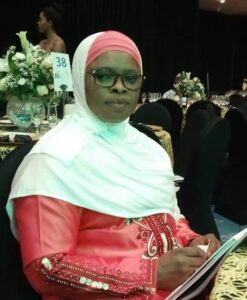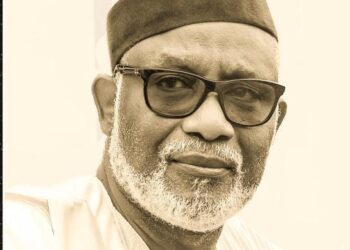REVIEWER: Murtala Uba Mohammed, PhD
A’aisha Abdulkareem’s debut novel touches on some of the most fundamental issues among Fulani and Hausa communities. These include girl-child education, early marriage and freedom of choice in a traditional society. Although the writer avoids mention of Hausaland or Nigeria, reading through the book, one can infer that the setting of the novel is spatially Northern Nigeria. Switching between rural and urban areas, the writer was able to capture the life of a typical Fulani and Hausa people (loosely referred to as Hausa-Fulani, because of the level of their cultural integration, intermarriage and common religious belief) who jointly constitute the major ethnic and cultural group in the country.
Through Teni, who was described as a “victim of misgiving and parental nonchalance”, the author was able to highlight the situation of the girl-child among the Fulani people. Being the first daughter (‘yarfari in the Hausa language), Teni was automatically deprived of the parental love, care or affection that a normal child receives. She was not raised by her parents, but rather by her grannies. She, therefore, remained in the village with her grandparents, even when her father, Kabiru, and mother, Husseina, settle in the city to enjoy the opportunities and glamour it offered.
Teni’s parents could not interfere in her affair not even show any open affection to her. As a result, she remained under the care of her grandparents in rural Kwame, a Fulani village, and lived the life of a daughter of a nomad, without access to education. All Teni was taught was how to take care of animals and remain submissive to whoever she would be bethrothed to. She was not offered any chance to love or be loved as she was married at the age of thirteen to a total stranger whom she (initially) loved not and that was done without her consent.
Teni was not given a chance to say her mind as regards the wedding. Her helpless father, who wanted his first child to join him in the urban area and learn new ways of life through education, could not do anything. Just like his daughter, he did not consent but was only informed after the process of the wedding (neman aure) had gone far. Kabiru could only make little effort, lose and retreat highly disappointed. All he could do was avoid participating in the wedding activity which he believed would add pain to his wound and that of his lovely but weak Teni.

The marriage of Teni and Abu reminded Husseina of hers and Kabiru. Her marriage too was without any premarital affection, nay giving chance for the two to indicate their choice, she had, though, learned to love her husband. She was, therefore, very much aware of the agony of an arranged marriage.
Apart from Teni and her parents, it seemed that nobody saw anything wrong in sticking to this cultural practice. At last, Teni was married to Abu, taken as a wife at a tender age, consummated with at the age of thirteen, and seemed to lose her dream of learning how to read and write in the language of the white man. Thanks to the effort of her mother, Teni’s marriage with Abu was saved through the little advice she offered to her daughter after breaking the cultural shackles and taking advantage of the dark hours that night offered.
Hesseina informed her daughter that she could still fulfil her ambition by being happy and hopeful and showing love to her husband, Abu, whose love for her was unquestionable. Luckily for Teni, Abu was a well-behaved young man with a zeal to attain heights in life. With the help of Alhaji Kabiru, Abu and Teni started to enjoy a life of delight, which was only terminated by the unfortunate students’ riot where innocent level 300 Abu was killed by a strayed bullet on his way to the students’ hostel.
This depressive happening hit Teni’s highest as she had started to love her husband, but it turned out to be a door for a new opportunity.
This was not, however, without challenges. Initially, a cousin to Abu indicated his interest in seeking the hand of Teni after completing her mourning (Idda) period. Thanks to a religious ruling, Teni’s grandfather informed her that now the ball was in her court (that as a widow, her consent must be sought first before engaging in the marital process). She politely declined the offer using the excuse that she had not still recovered from the loss of her Abu and that she had her twins to take good care of.
Alhaji Kabiru used this opportunity to move his daughter to an urban area, engaged a private teacher to educate her and later enrolled her in secondary school (despite her age and having children at an earlier age). With determination, intelligence and encouragement, Teni was able to finish her secondary school education with flying colours and secured admission to study medicine at a university. Not only that, Teni met a young brilliant, Dr Imran who despite her age and being a widow, insisted on picking her as his first (and likely his only) wife. The two married at last and life continued.
The writer can be described as a mild feminist (if the term exists) as she uses this novel to question some forms of patriarchy in the community. The work is critical as it amplifies the importance of education and the need for it at all ages and by all, regardless of gender or setting.
Reading this book, one can learn about the cultural practices among Fulani and Hausa communities, especially on matters related to marriage. The language used is quite modest, simple and clear. The novel can be read by both young and adults considering its careful choice of words. Using a simple story, the writer was able to challenge some the cultural practices that are not in tune with current reality. Whoever starts reading this novel could appreciate the flow of the story which makes it difficult for one to stop without completing it.
Although one must commend the writer’s command of and ability to use the English language as a medium to project the culture of Hausaland, it would only be fair to mention some of the shortcomings in the book. I am particularly not comfortable with the writer’s lack of mastery of Hausa orthography. This is quite unforgivable considering where the writer comes from. The most noticeable of this orthographic error is in the title of the book where the word ‘Yarfari was mistakenly written as Yar’fari which is totally in contrast with the rule of Hausa writing.
Although not exhaustible, this review can only point to a few of such instances. On p. 66 nagode was written instead of na gode; kunnun gieda was used for kunun gyaɗa on page 69; as well as Ina wunin unku? for Ina wuninku? and Duksuna nan lafiya for Duk suna nan lafiya, all on page 59. A little consultation could have helped the writer to avoid this slip. I hope these corrections and more will be taken care of in the subsequent editions.
* Murtala Uba Mohammed, a member of Association of Nigerian Authors (ANA), Kano State chapter, is the Northwest PRO of Northern Nigeria Writers Summit





